The following has mild spoilers for 28 Years Later (nothing you didn’t see in the trailers). Skip the footnotes if you are avoiding major spoilers.
Two huge horror franchises returned this summer with Final Destination: Bloodlines and 28 Years Later. I did not have high hopes for either new entry. I consider 28 Days Later a horror masterpiece but have hated every Alex Garland project since Ex Machina, and even Final Destination fans will tell you that the last two movies are basically unwatchable.
So I was surprised when Bloodlines nailed it while 28 Years Later ate shit on every rung of toilet ladder. Bloodlines’ success is that it commits to the Final Destination thesis of everybody fucking dying. The monster in Bloodlines, as it is in all the Final Destination movies, is one’s unexpected proximity to their mortality. It is not, as has become trendy in horror films today, some maudlin expression of grief or anxiety. There is no comforting Black therapist, as has become very trendy in horror films today, to talk the protagonist out of seeing their monsters. The family at the center of Bloodlines seems awfully nice; they’re supportive and loving while also being complicated and a little annoying. It doesn’t seem fair that they’re the ones selected for this blood-soaked destiny but it wouldn’t be a horror movie if everyone got what they deserved.
I could go into detail about the minute and specific things that repulsed me about 28 Years Later. The big-swingin’ Mandingo zombie. The aughts style bait-and-switch marketing to make you think this was a movie about a dad, but it’s actually a movie about a mom. Groundbreaking. The multiple, obvious set-ups to an expanded universe populated by Chav power rangers and other toy commercial caricatures. Because for all the allegedly weirdo choices of 28 Years Later1, the movie is extraordinarily safe, hitting all the standard tropes and spinny camera angles of the modern coming-of-age parent-child movie.
But what I found most irredeemable was the movie’s airless and unrelenting sense of wonder. Last year I described another horror threequel, A Quiet Place: Day One, as a movie about furiously edging on your love for the world. 28 Years Later follows in its footsteps, ditching any commentary about Brexit or isolation or anxiety in favor of an insipid lesson about ~ wuv ~, establishing itself in the emerging genre tradition I’ve started thinking of as wondercore.
There is an internet-famous Pauline Kael quote from the introduction to her now out-of-print collection Hooked that does the rounds online every so often: “Movies that are consciously life affirming are to be consciously avoided.” But the Kaelishness I’m thinking of is from her infamous pan of Sound of Music:
“They're the Pavlovs of movie-making: they turn us into dogs that salivate on signal. When the cruel father sees the light and says, ‘You've brought music back into the house,’ who can resist the pull at the emotions? It's that same tug at the heartstrings we feel when Lassie comes home or when the blind heroine sees for the first time; it is a simple variant of that surge of warmth we feel when a child is reunited with his parents. It's basic, and there are probably few of us who don't respond. But it is the easiest and perhaps the most primitive kind of emotion that we are made to feel.”
I’m not anti-sentiment. I most recently welled up at Ha Ha Ha Ha Ha Ha Ha, a solo show at the Public Theater by clown Julia Masli. At the risk of being annoying, Masli’s show isn’t quite a play but more an experience. She climbs into the seats, forcing audience members to share the issues weighing on them — and then gets everyone else to solve their problems. She sourced Venmo donations for a struggling art teacher, convinced an audience member to buy another an ice cream cone. All the criticisms I applied to 28 Years Later could apply to HA etc.; Masli, enveloped in a blue blob of fabric, light affixed to her head and a tinkling bell in hand, should be twee. It should be unbearable. But Masli’s show worked for me in a way that few wondercore movies do.
Wondercore movies seem designed to make you forget about the Trump presidency, and instead drag you into contemplation of the awesome, vague power of love. They are so uprightly nice that you feel bad for criticizing them but then feel even worse when you cry at the obvious bait. They are the aggressive huggers of filmmaking. I’m thinking of the aforementioned A Quiet Place: Day One, Pig, CODA, The Whale, The Last Showgirl and most movies with dramatic dance sequences by terrible dancers, and patron saint Everything Everywhere All At Once. But Masli’s show was biting. When someone in the audience said that he was drowning in gambling debt, she didn’t turn away to find a softer edge. She asked more questions, drew all of us into observation, and maybe judgment, of this stranger.
Audience feedback means the show is different every night but I imagine it doesn’t vary widely. Masli has a reliable set of props to return to because most of the problems we have, and especially the ones we’re willing to share, are pretty much the same. People are hungry, tired, and/or lonely: what else is there? What these wondercore movies don’t get is that we don’t have to like someone, much less love them, to recognize our shared humanity. I will be just as moved, and maybe more charmed, if Lassie pulls a kid out of the well and then bites him.
I would have preferred a tougher, nastier Spike, one more similar to his cocksure father than his wilted English rose mother. His decision to journey to the mainland makes more sense if ascribed to arrogance, rather than naïveté, and as he is, he doesn’t have an especially interesting arc. Spike starts the film wide-eyed, trembling, and unable to defend himself — and in the movie’s final scene, he’s in the exact same position, albeit with some newfound Latin vocab.
Spike’s relationship with his mother is the motivating engine of 28 Years Later but the script doesn’t even do us the disservice of a cliché. Their bond is nonexistent, without any of the thorniness, the resentment, the anguish that should be present in the story of a boy with a critically sick mother. I think of the tender bond in Thelma between Thelma and her doofy grandson; the cold distance in Moonlight between Paula and Chiron; the brittle security offered by Brenda to Owen in I Saw The TV Glow. These were mothers who powerfully loved their children, maybe all the more so because they recognized their limitations. But Jodie Comer, who seems doomed to star in movies that will never showcase any of that talent I’ve heard so much about from Killing Eve stans, mostly just does Bertha Mason crazy-lady-in-the-attic shit. Her character is there to scream, enter plot-contrived fugue states, and set up a storyline (and undoubtedly some debilitating future psychosexual dynamics) for her son.
The problem with 28 Years Later, and the other movies in this wondercore genre, are that they’re wish fulfillment for the most mundane wishes. They offer worlds that are predictable and fair, that never give us more hardship than what we can grow from. They’re soma for jaded, tired adults. I understand the desire for comfort in uncertain times. There’s already so much cruelty in the world; do we have to replicate it in our art?
But I also think that maybe we should feel anxiety and rage, not comfort, when we see movies that purport to examine our times and our elected governments. Especially if they’re ostensibly horror movies. We are a few years away from people en masse using AI to generate individually-tailored and entirely unchallenging stories, free of sex scenes or wokeism or whatever fake issue your parents/kids complain about. It’s the logical progression in an algorithm-based media landscape that promises to only give you more of what goes down easiest.
There were only a few, fleeting moments in 28 Years Later that reminded me of the prescient fury of the first film — the two long scenes of Jamie (Aaron Taylor-Johnson) and Spike entering and fleeing from the mainland. Accompanied by Rudyard Kipling’s “Boots” in what has to be one of the most effective uses of poetry in a movie since Paterson, and flashes of anonymous Anglo iconography, we see the pair within a long, gruesome history of British colonization and survival. It’s here that Boyle acknowledges the horror premise of the series: the terror of living so close to your own mortality. The thrill that this fear inspires in Jamie echoes the most nightmarish scenes in 28 Days Later, when it’s the uninfected men that prove to be the most vicious.
There is a boom in horror fiction right now, as there often is when society is in multifold crises. Because yes, horror provokes our anxieties, but it also shows us how to survive them. It’s a genre that is meant to challenge and provoke and discomfit. And 28 Years Later isn’t really horror — it’s a coming-of-age family drama in a genre tracksuit. But that’s not what I want from my zombie movies. There’s no catharsis in feeling good all the time.
Chiefly 1) the baby doll prop that every male director apparently gets to borrow for one movie and 2) Ralph Fiennes doing Old Yeller to mummy

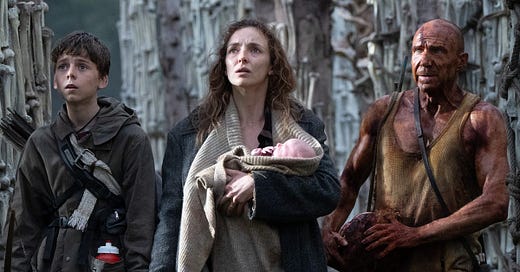



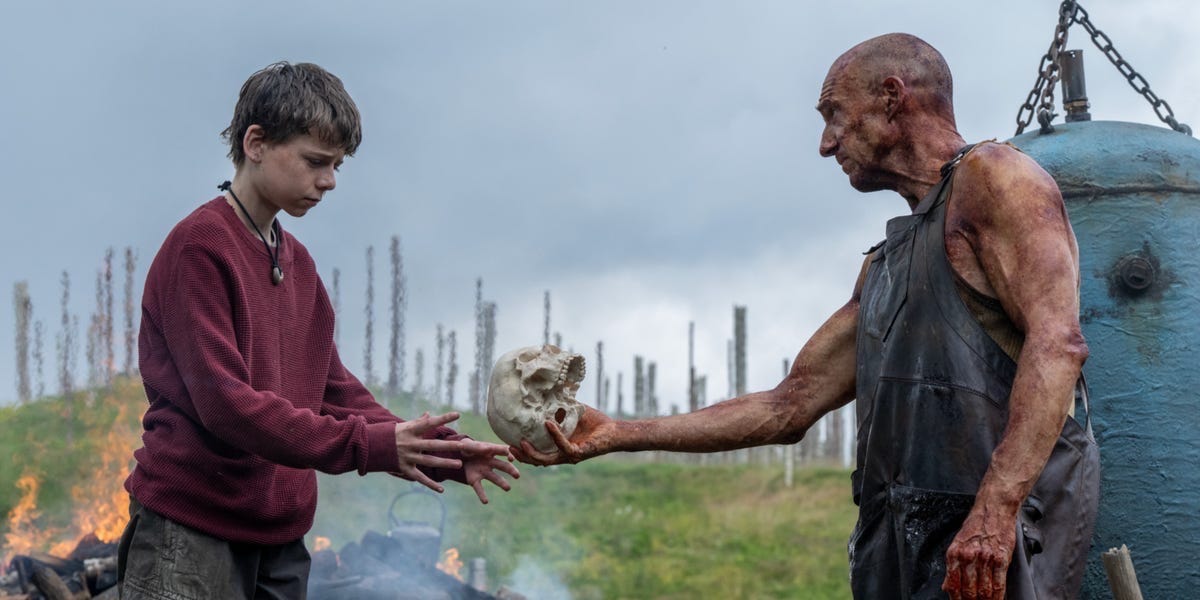

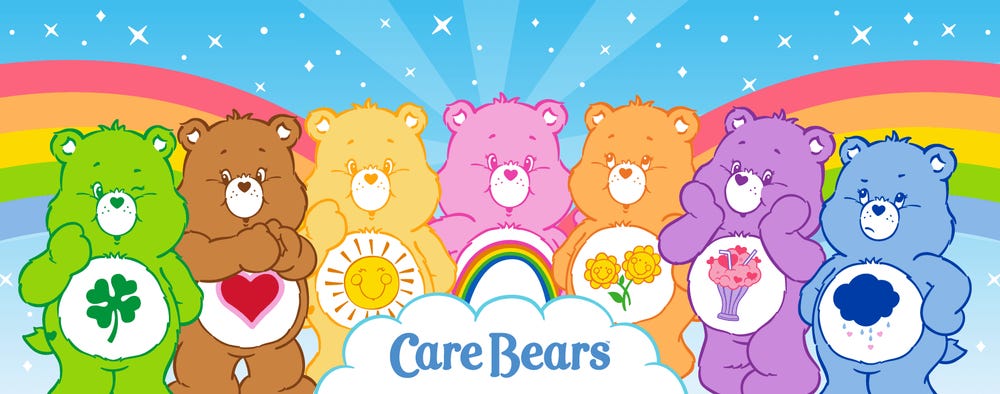
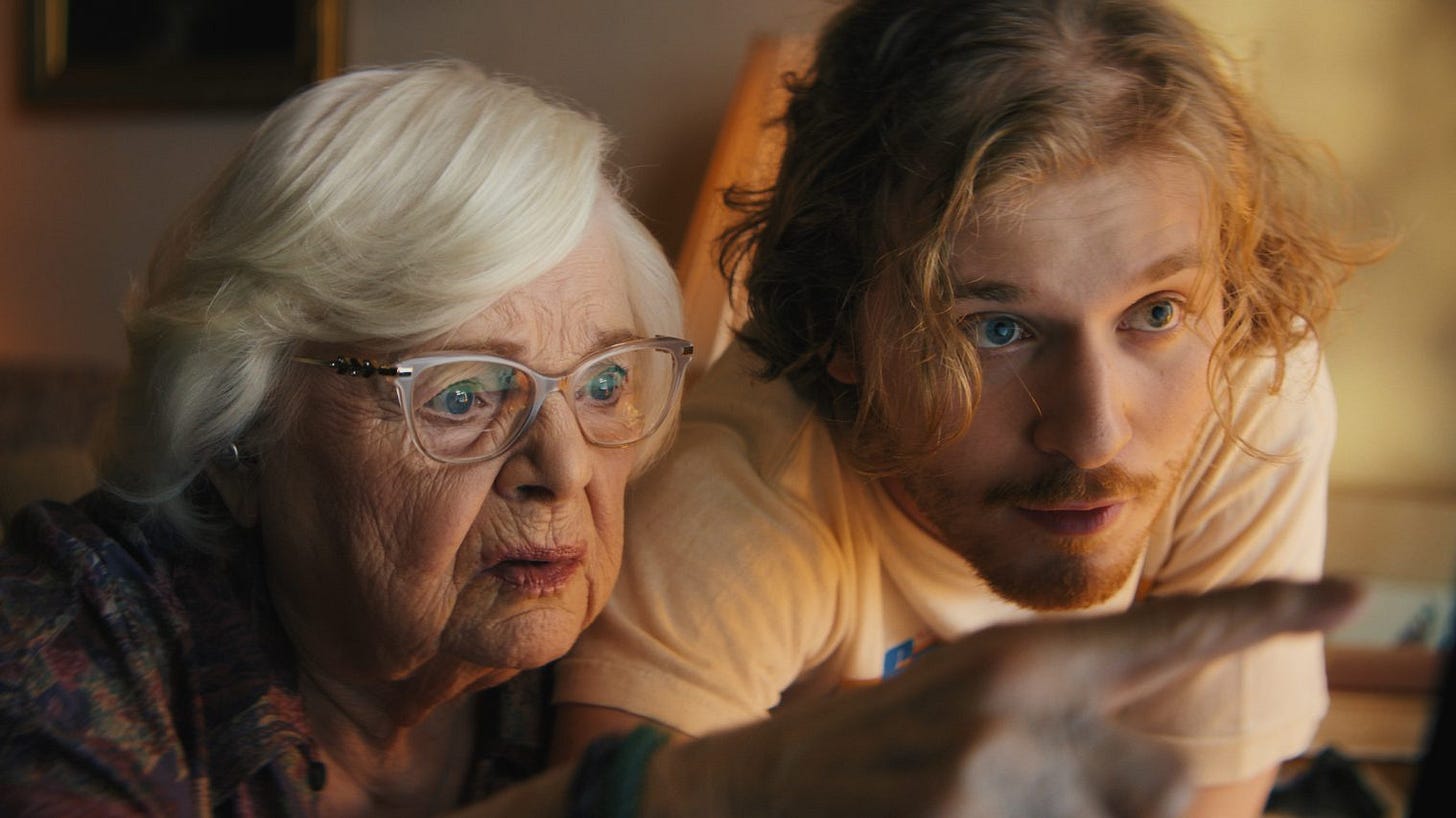
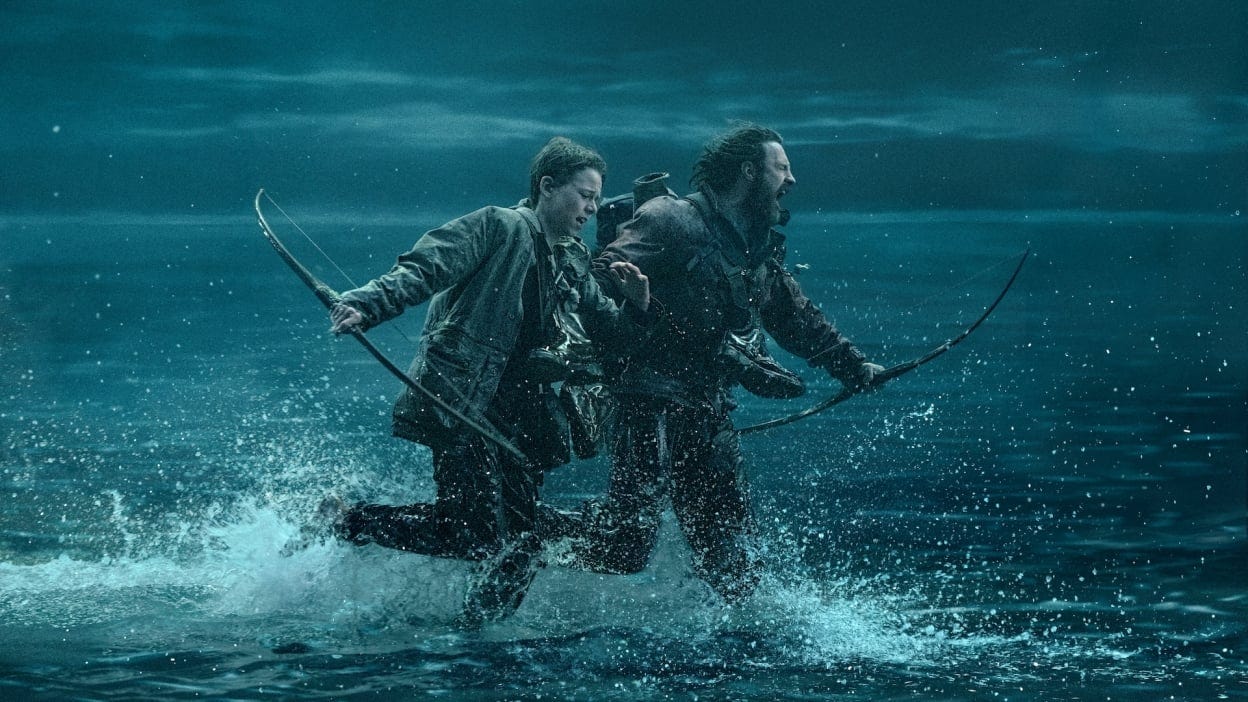
I can understand the sentiment regarding 28 Years Later, but I read that third act a bit differently. It seemed like the movie wanted to have the kid grow up very quickly, which I understood. But I was intensely suspicious of the woodsy Dr. Moreau somehow diagnosing Mum's cancer, and then murdering her in front of the boy, and presenting him with a freshly-washed skull.
It was ghoulish and upsetting, mostly because of the gratuitous speed of the event, and mostly because, conveniently, Doc just happens to have a nice spot on his skull pile for her. I didn't trust him at all. The soundtrack and cinematography are lulling you into endorsing something that's deeply, horribly wrong. I think Doc was trying to push "wondercore" onto the kid, but in the only way he knew how.
The very idea of being presented with the skull of your mother, alive only hours ago, is so deeply upsetting to me, but here, Doc Fiennes tries to excuse it as some sort of "rite of passage". I found it perverse, and appreciated it as such. I hope I am not wrong about Fiennes' character, but in some ways, perhaps I hope I am right.
Fromtheyardtothearthouse.substack.com
At the risk of being simple, and slightly wondercore, I thoroughly enjoy your writing. Thank you.